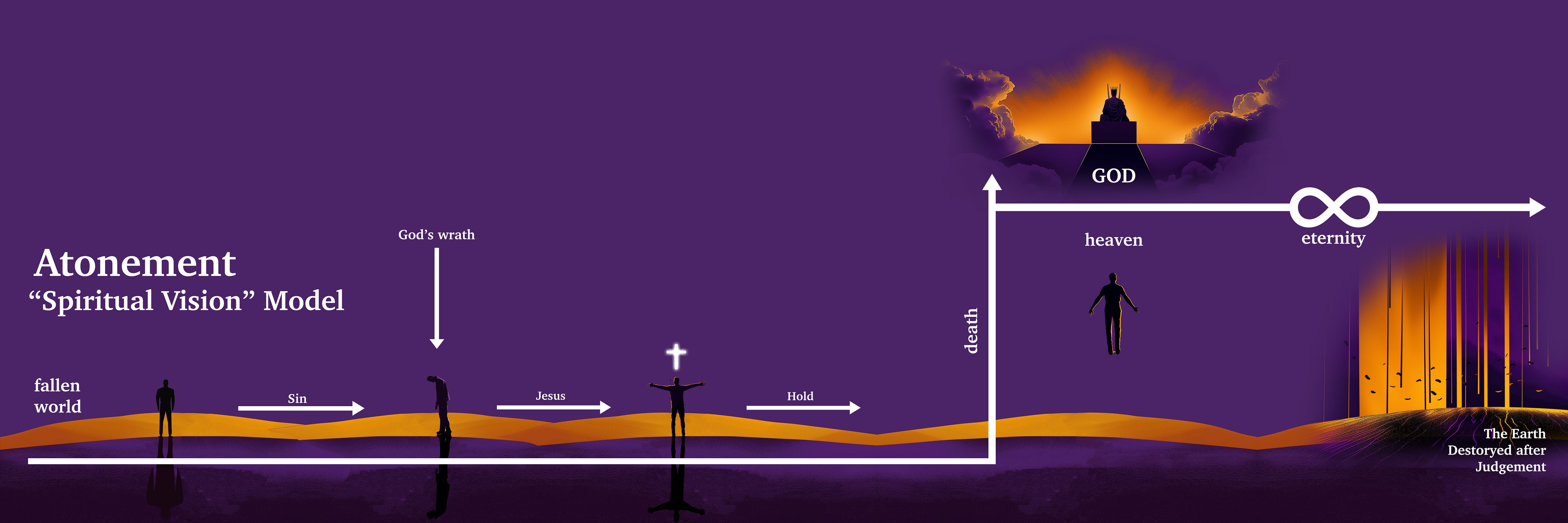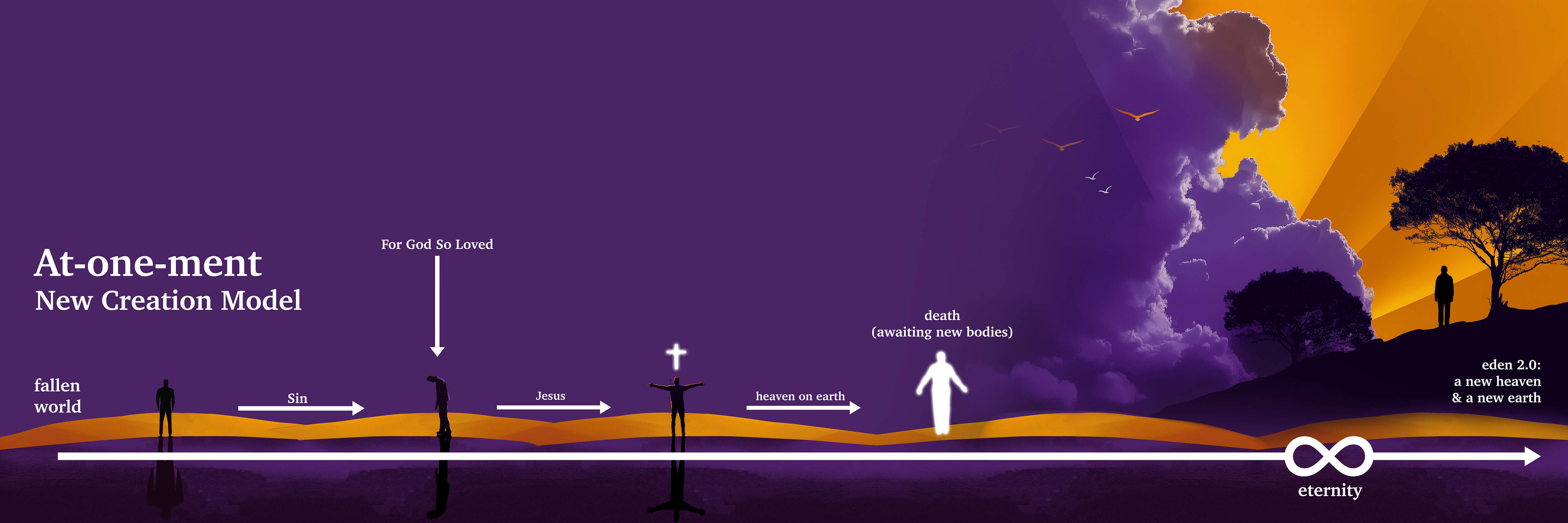Introduction
If you’re a Christian who has lived in the West within the last hundred years or so, you probably have a fairly clear picture in your head about Heaven. You might imagine heaven as a place up in the sky, in the clouds. Or envision angels sitting on the edge of the clouds with their legs draped over the side, strumming away at harps. Perhaps St. Peter stands at the golden gate of heaven turning away those who just weren’t good enough to enter? These are hyperbolic or even silly examples, but there persists a concept that there is a place we go to away from this earth when we die for all eternity.
Is this what the Bible actually says about heaven? Is this actually true?
Let’s take a look at what a common view of heaven is.
The “Spiritual Vision” Model of Heaven
A prominent contemporary Christian understanding of Heaven is constructed upon several core tenets:
Man Lives in a Fallen World: Humanity exists in a world tainted by sin and suffering, a condition stemming from the Fall of Man as described in the first few pages of Genesis when our ancestor, the first Adam, ate of the forbidden fruit
Original Sin: Due to original sin, all humans are inherently sinful and wretched and God has his wrath stored up against those who don’t agree with him.
Jesus as the Solution (or else): Acknowledging one's sinfulness and accepting Jesus Christ as the savior is seen as the solution to humanity's sin problem. Jesus is the only way to keep the wrath of God from roasting you alive where you stand.
Beam me up: And, if you just continue to hold on to this knowledge in your head as long as possible until you die (and you’ll probably want to go to church…regularly), then you will be given admittance into heaven.
Go to a heavenly place: This Heaven is a different plane of existence altogether that exists apart from Earth where our spiritual bodies will inhabit after we die. It is the place where God “lives”. It is thought to be “in the sky” or in “heaven above”.
The Roots of this Spiritual Vision Model
We will explore how Platonism was a major factor in these errant interpretations of Heaven, however there were a few scriptural evidences that could be construed to justify this view:
Luke 17:21: “The kingdom of God is within you.”
Romans 14:17: “For the kingdom of God is not a matter of eating and drinking, but of righteousness, peace and joy in the Holy Spirit.
1 Corinthians 15:50: “Flesh and blood cannot inherit the kingdom of God.”
2 Peter 1:4: “partakers in the divine nature.”
Colossians 1:27: “Christ in you, the hope of glory” (Col. 1:27).74
The Influence of Platonic Thought on Christian Eschatology
“Greek-speaking Christians influenced by Plato saw our cosmos as shabby and misshapen and full of lies, and the idea was not to make it right, but to escape it and leave behind our material bodies.”
N. T. Wright
Platonism originates from the ideas of the ancient Greek philosopher Plato (427–347 B.C.). Plato was a pioneer in arguing that true reality is primarily abstract or ideal rather than physical. He introduced the ‘theory of forms,’ which posits that the ultimate reality exists not in the objects and concepts we experience on Earth, but in transcendent ‘forms’ or ‘ideas.’ These forms are perfect, universal templates for everything we encounter in the physical world. For instance, all horses on Earth are merely imperfect copies of the ideal ‘horseness’ that exists in another higher realm.
This philosophical stance led to the belief that matter is inferior to the spiritual, creating a dualism between the physical and the immaterial. This perspective naturally engendered negative views of the physical world and the human body. In Plato’s work "Phaedo," Socrates, awaiting execution, tells his friends that he looks forward to death because it will free him from his physical body, allowing him to focus on higher spiritual values. For Plato (and Socrates), the human body is a prison for the soul.
Plato’s ideas have profoundly influenced philosophy, particularly the philosophy of religion. Gary Habermas in On the Resurrection, Volume 1: Evidences notes that Plato’s concepts of forms, cosmology, and the immortality of the soul have had the greatest impact in this field.
This exaltation of the spiritual over the physical carried over into Judaism, as seen in the writings of Philo (20 B.C.–A.D. 50). Philo, aiming to make the Old Testament more appealing to Greeks influenced by Platonic ideals, often allegorized passages that seemed crude or unworthy of God. For Philo, references in the Old Testament to God's wrath or changing His mind needed to be understood allegorically.
Platonism also influenced Neo-Platonism, a more religious interpretation of Plato's ideas founded by the Roman philosopher Plotinus (A.D. 204–270). Plotinus maintained several key Platonic ideas, such as the existence of an immaterial reality separate from the physical world, a clear distinction between the soul and the body, and the belief that the soul’s ultimate fulfillment comes from unity with an eternal, transcendent realm. According to Plotinus, matter represents the lowest level of reality and is viewed very negatively. Plotinus himself was so disdainful of physical things that he neglected his health and hygiene, to the dismay of his students.
Many early Christians were not only unthreatened by Plato but were also deeply impressed by his ideas. Diogenes Allen in Philosophy for Understanding Theology notes that Plato "astounded the Apologists and the early Church Fathers." When early Christians read Plato's creation story in his work "Timaeus," some thought he might have read Moses or received divine revelation. They saw similarities between Plato's ideas and Christianity as evidence that pagan philosophers could have been open to Christian ideas as if divinely inspired.
As such, Platonic thought significantly influenced early church theologians, especially those in the Eastern Church and the Alexandrian tradition, such as Clement of Alexandria and Origen. Jeffrey Burton Russell states, "The great Greek fathers of Alexandria, Clement and Origen, firmly grounded in Scripture, were also influenced by Platonism and Stoicism."
Theologians in the Alexandrian tradition held Greek philosophy in high esteem and aimed to show that Christianity was consistent with its best elements. Clement of Alexandria (150–215), like his predecessor Philo, preferred an allegorical interpretation of biblical history, transforming it into moral truths with a philosophical slant. He believed that God used philosophy to prepare the Greeks for Christ, similar to how the law of Moses prepared the Hebrews. Clement respected Socrates and Plato, considering Plato's role akin to Moses's, and viewed the body and matter as inferior to the spirit, though perhaps not inherently evil.
Origen of Alexandria (c. 185–254) played a crucial role in integrating Platonism into Christianity. Alister McGrath describes Origen as "a highly creative theologian with a strongly Platonist bent." Origen made significant changes to Christian eschatology, "dissolving the Christian expectation of the resurrection of the body into the immortality of the soul," suggesting that Christian perfection involves progressive dematerialization. He even proposed that the resurrection body was purely spiritual and interpreted kingdom texts in the Bible in a purely spiritual, interior, private, and realized sense.
These early Christian thinkers leveraged Platonic philosophy to articulate and expand Christian doctrine, highlighting the significant impact of Plato's ideas on the development of early Christian theology.
Platonic dualism contributed to the notion that the material world is inherently inferior to the spiritual realm, leading to the belief that the afterlife is a non-material, purely spiritual existence. This perspective is evident in various strands of Christian theology that emphasize the soul's departure from the body and ascent to a non-physical Heaven. Such views often contrast with the biblical depiction of a renewed creation, where physicality and spirituality are harmoniously integrated.
Now, let’s look at the word atonement.
The Origin of the Word "Atonement"
The word atonement carries with it a modern understanding of “paying a penance.” The dictionary definition has been transformed over the years to become “reparation for a wrong or injury.”
What is not generally understood is that William Tyndale, in his translation of the Bible into English in the early 16th century, coined the word "atonement" to express the concept of reconciliation between God and humanity. The word is a synthesis of "at," "one," and "ment," effectively capturing the idea of being "at one" with God. Tyndale's neologism was an attempt to convey the profound theological concept of reconciliation and redemption in a single term. Before Tyndale's translation, the concept was often described using phrases like "reconciliation" or "propitiation," but Tyndale's "atonement" provided a succinct and powerful term that encapsulated the essence of the biblical doctrine.
Tyndale’s invented word at-one-ment was intended by him to describe to us a state where God and humanity would be one. Where God would tabernacle with us forever.
The Kingdom of Heaven is at Hand
"The kingdom of God is in your midst."
Luke 17:21
The contemporary view of heaven is replete with imagery and troupes of believers retaining their “spiritual” self or “soul” beyond the grave into a spiritual kingdom that is outside the corporeal realm in which we now inhabit.
However, Mark 1:15 declares, "The Kingdom of Heaven is at hand," signaling that the Kingdom is apparently accessible to believers here on Earth now that Jesus had arrived to claim the Kingdom. This proclamation indicates that Heaven is not merely a distant, post-mortem reality but a present and transformative one. The Kingdom of Heaven, as preached by Jesus, involves a radical reorientation of life toward God's will, beginning here and now.
Ephesians 1:10 - Unity of Heaven and Earth
Ephesians 1:10 speaks of God's plan "to unite all things in him, things in heaven and things on earth." This scripture challenges the notion of Heaven as a separate, ethereal realm and instead portrays a vision of unity and restoration where Heaven and Earth are brought together. This unity is a central theme in Pauline theology, emphasizing that through Christ, the fragmentation caused by sin is being healed, and all of creation is being reconciled to God. Colossians 1:20 echoes this sentiment: "and through him to reconcile to himself all things, whether things on earth or things in heaven, by making peace through his blood, shed on the cross."
These Biblical concepts do not reconcile with the view of a separate Heavenly realm. Evidence also suggests the earliest Christians knew this and were trying to codify and affirm these facts before the taint of Platonic thought consumed the faith.
The Apostles' Creed and the Resurrection of the Body
The Apostles' Creed, one of the earliest statements of Christian belief, includes the declaration, "I believe in the resurrection of the body." This creed dates back to the early centuries of Christianity and reflects the belief that the resurrection involves the restoration and glorification of the physical body, not merely a disembodied existence.
This affirmation highlights an earlier Christian view of Heaven that differs significantly from this more modern, Platonic-influenced perspective. The resurrection of the body underscores the holistic redemption that includes both spirit and flesh. Paul's discussion in 1 Corinthians 15:42-44 about the transformation of the body at the resurrection ("The body that is sown is perishable, it is raised imperishable; it is sown in dishonor, it is raised in glory; it is sown in weakness, it is raised in power; it is sown a natural body, it is raised a spiritual body") emphasizes the continuity and renewal of the physical aspect of human existence in the afterlife.
The New Creation Model of Heaven
So it is evident that we have been unduly influenced by pagan philosophy and cosmology and the result is a skewed vision of heaven and the restoration of humanity. However, a comprehensive biblical understanding reveals a more integrated view of Heaven and Earth:
Fallen World: Humanity lives in a fallen world due to original sin, as described in Genesis 3.
Separation from God: Sin creates a chasm between humans and God, symbolized by the expulsion from the Garden of Eden (Genesis 3:23-24). This separation is based in belief, but is rooted in action. We act like children of wrath rather than children of God and Heaven is kept at bay and sin perpetuates.
God's Love: Despite this separation, God's love compelled Him to dwell among us to heal this division. John 1:14 states, "The Word became flesh and made his dwelling among us."
The Kingdom of Heaven on Earth: Acceptance of Jesus brings believers into a present Kingdom on Earth, which will continue eternally. An accessible kingdom with power and benefits available to us in our fleshly bodies.
Glorified Bodies: Believers will receive glorified bodies upon Jesus' return, and Heaven and Earth will merge, echoing the pre-fall state of the Garden of Eden. 1 Corinthians 15:42-44 explains the transformation of the body in the resurrection.
The Bible consistently presents themes of restoration and renewal. Revelation 21:1-3 describes a new heaven and new earth where God dwells with His people: "Look! God's dwelling place is now among the people, and he will dwell with them." Similarly, Isaiah 65:17-25 envisions a transformed creation where peace and harmony prevail, reminiscent of Eden. These passages underscore the biblical hope not for an escape from the material world but for its redemption and renewal.
The modern view of Heaven, centered on penal substitutionary atonement, underscores humanity's need for reconciliation with God through Jesus Christ in order to leave these wretched, sinful bodies and be transported to a higher plane of existence. However, a comprehensive biblical understanding reveals that Heaven is not merely a distant future reality but a present Kingdom accessible through faith, culminating in the ultimate restoration of creation. This reality of Heaven is through Christ’s own words accessible to us here in this world. When we accept Christ and conform to His will, heaven and earth meet and Eden is restored. This restoration of Eden can then continue in each of us for all eternity.
This restored Eden, where God and humanity dwell together, reflects the true biblical vision of Heaven. Understanding at-one-ment as the means by which this reconciliation and restoration are achieved helps to illuminate the depth and breadth of God's incredible redemptive plan.
Have you misunderstood the reality of heaven? If so, say this prayer:
Glorious Father, I believe your son came to this earth and brought heaven with him. I know now that I am supposed to be a representative of the Kingdom of Heaven here on earth to all those around me in my family and my community. I believe that all of the resources of heaven are at my disposal here and now. Help me with your Holy Spirit by guiding me in ways that align with how Jesus lived so that heaven will abound in the world. Help me to love others with christlikeness in everything I do, in Jesus’s mighty name. Amen!
Bibliography
The Holy Bible, New International Version.
Tyndale, William. The New Testament. 1526.
Wright, N.T. Surprised by Hope: Rethinking Heaven, the Resurrection, and the Mission of the Church. HarperOne, 2008.
Alcorn, Randy. Heaven. Tyndale House Publishers, 2004.
Gorman, Michael J. Inhabiting the Cruciform God: Kenosis, Justification, and Theosis in Paul's Narrative Soteriology. Eerdmans, 2009.
Augustine. Confessions. Translated by Henry Chadwick. Oxford University Press
Habermas, Gary. On the Resurrection, Volume 1: Evidences, B&H Academic, 2024
Jeffrey Burton Russell, A History of Heaven: The Singing Silence, Princeton University Press, 1997.
Alister E. McGrath, A Brief History of Heaven, Blackwell, 2003.
Diogenes Allen, Philosophy for Understanding Theology, John Knox, 1985.








